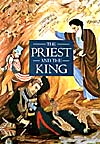Books
Feb 15-19, 1999 / Bahman 26-30,1377
Book of the week
* Fiction: House
of Sand and Fog
Past picks
* Novella: Women
without men
* Diary: The
Priest and the King
* Literature: Daneshvar's
Playhouse
* Epic: The Tragedy
of Sohrab and Rostam
Do you want your book advertised or featured
here? Send review copies to: The Iranian, PO Box 34842, Bethesda, MD, 90827
email us

House of Sand and Fog
By Andre Dubus
Dubus tells his tragic tale from the viewpoints of the two main adversaries,
[Amir] Behrani [, a former colonel in the Iranian military under the Shah,]
and Kathy [Nicolo, a self-destructive alcoholic.] To both of them, the
house represents something more than just a place to live. For the colonel,
it is a foot in the door of the American Dream; for Kathy, a reminder of
a kinder, gentler past. In prose that is simple yet evocative The House
of Sand and Fog builds to its inevitable denouement, one that is painfully
dark but unfailingly honest. -- Alix Wilber, Amazon.com
Go to top

Women Without Men
A novella
By Shahrnush Parsipur
(Kamran Talattof Jocelyn Sharlet, translators)
The significance of Parsipur's work transcends the realm of literary
activities. Her works were among the first feminist-conscious enunciations
that appeal in the postrevolutionary period in response to limitations
imposed on women by the state ideology... The following stories [reflect]
the role that the rise of feminist-consciousness may play in the course
of cultural change in Iran." -- Introductuon
Go to top

The Priest and the King
An Eyewitness Account of the Iranian Revolution
By Desmond Harney
An extraordinary and riveting diary of the events
that led to the Shah's overthrow... Harney conveys superbly the ups and
downs, the rumors and speculations, the paranoia, ... as the old order
was undermind. You can hear the helicopters whirring frightening the impotent.
-- The Sunday Times
Go to top

Daneshvar's Playhouse
A Collection of Stories
By Simin Daneshvar
In five intriguing stories, the formal detachment of Daneshvar's prose
reinforces her subtle revelation of repressive features in Iranian society.
. . . These seemingly simple stories disclose a rich culture in a time
of ferment and change, of women in chadors, held in contempt by the men
who control their lives. . . . This volume is a valuable addition to our
knowledge of Persian culture and the political complexities of modern Iran.
-- Publishers Weekly
Go to top

The Tragedy of Sohrab and Rostam
From the Persian National Epic, the Shahname of Ferdowsi
By Jerome W. Clinton (Translator)
Go to top
|
![]()